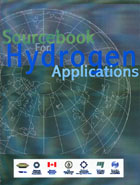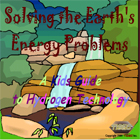
 Enter HyVIEW™
Enter HyVIEW™
Quick Links
| Why Hydrogen?Energy System ChallengesThe Perfect Fuel?What's Happening?Who can Help? |
Why Hydrogen?
The idea of something so abundant and omnipresent as hydrogen replacing the diminishing supply of fossil fuels has intrigued social visionaries from Jules Verne to an army of modern day technical and environmental proponents.
Hydrogen is the simplest, naturally occurring atom. The most abundant of all the elements, it accounts for three-fourths of the universe's mass. On Earth, it is mostly found chemically bound to other elements. It can be extracted from many materials - natural gas, methanol, coal, bio-mass and water.
Over the next 20 years, the impact of global climate change on our society, energy scarcity, national security issues and the improved efficiency of hydrogen-based technologies will create new opportunities for hydrogen.
Science Fiction?
In 1870, Jules Verne's “Mysterious Island” described a world that would one day derive “an inexhaustible source of heat and light” from water's component parts. Back then, Verne did not realize that this source was also virtually pollution-free.
The cycle is so elegant, it seems nearly miraculous: separate water into its two constituent gases: hydrogen and oxygen, burn the hydrogen for fuel, and it re-couples with oxygen to form water again. No nasty particulates … no insidious carbon monoxide … no eye-stinging ozone or sulfur dioxide.
The only possible pollutant is small, controllable amounts of nitrous oxides produced at high temperature when hydrogen is burned in the presence of air. However, even this can disappear if fuel cells are used as energy conversion device instead of internal combustion engines. Hydrogen's exhaust is mainly plain water vapor that can be recaptured and converted once again to hydrogen.
Rising to the Challenge!
Today, a greatly expanding and dedicated group of scientists, engineers and environmentalists is actively working, with much success, to promote the increasing use of hydrogen as a fuel to solve many of our concerns with conventional fuels. In fact, what was once science fiction to Jules Verne is now a science, which can actually address:
- A number of environmental and health concerns.
- The prospect of depletion of the world's hydrocarbon resources.
- And economic and political problems associated with worldwide fuel procurement
and distribution we presently face.

